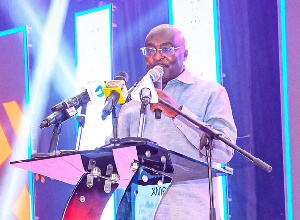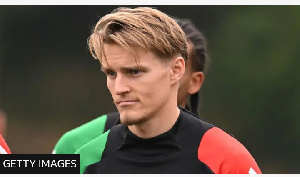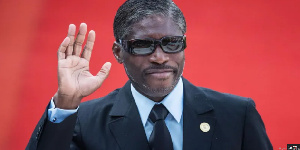- Home - News
- Polls
- Year In Review
- News Archive
- Crime & Punishment
- Politics
- Regional
- Editorial
- Health
- Ghanaians Abroad
- Tabloid
- Africa
- Religion
- Election 2020
- Coronavirus
- Photo Archives
- News Headlines
- Press Release
General News of Thursday, 1 July 2021
Source: classfmonline.com
Ejura shooting: Be calm, don’t hinder probe, mind your language – Peace Council to locals, media
The National Peace Council has, in a statement signed by its Chairman, Rev Dr. Ernest Adu Gyamfi, expressed “grave concern that three Ghanaians have lost their lives” in the recent disturbances in Ejura, Ashanti Region.
Two of the victims were shot by soldiers, as hundreds of irate youth demonstrated to demand justice for lynched social media activist Ibrahim Kaaka Mohammed.
“The council condemns this unfortunate incident and calls on the relevant agencies to conduct thorough investigations into the matter without delay”, the statement from the Peace Council said.
The council noted, “with appreciation, the president’s directive” to the minister for the interior, “to conduct a public inquiry into the circumstances that led to the unfortunate occurrences”, saying: “We encourage the proposed committee to work within the terms of reference”.
The council has also expressed “its deep condolences to the affected families” and encouraged “all persons in the community to keep calm and allow the investigations to take their full course without hindrance”.
The council further appealed to the “media and all those who make statements on the matter, to exercise maximum restraint in their pronouncements”.
Meanwhile, a former Chief of Staff, Brigadier Joseph Nunoo-Mensah (retired), has said the Ghana Armed Forces is full of “riff-raffs” pushed in there by the two main political parties – the governing New Patriotic Party (NPP) and the biggest opposition National Democratic Congress (NDC).
Speaking on Class91.3FM’s morning show on Wednesday, 30 June 2021 about the Ejura disturbances, the retired army officer said: “The people in the military, they are not in the right type of employment. Most of the soldiers are either coming from NPP or NDC – riff-raffs who have been put into uniform”.
In his view, “there’s a huge problem of political interference”.
“You don’t allow the people appointed as IGP or Chief of Defense Staff to do the job”, he complained.
He also noted that soldiers “are paid to shoot and kill”, adding: “A soldier’s job is not to disperse crowd”, he told Kofi Oppong Asamoah.
Brigadier Nunoo-Mensah said as a soldier, “I’ve never learnt how to disperse a crowd. It’s not my job”.
“They [soldiers] are paid to shoot – not in the air – but at the chest, where it’s mostly going to cause death”, the retired army officer said.
He said deciding to use the army in such situations comes with hefty consequences, and, so, such a decision must be a well-thought-through one.
“So, you don’t use them just like that”, he warned, noting: “When the military comes, it’s not a joke, it’s a serious business”.
He bemoaned: “Unfortunately, since the coming into force of the fourth republican Constitution, we have messed up all our institutions”.
“You talk about the Emile Short Commission; what happened? Nothing happened”, he noted.
“It made wonderful recommendations but nothing happened. I don’t believe anything will happen”, Brigadier Nunoo-Mensah said, adding: “And it is sad”.
He warned: “It’s going to get worse because we are not applying the right force at the right place”.
In his view, “when you get a problem in Ejura, you don’t call soldiers but we’ve [been calling] them since the fourth Republican Constitution came into force the Ayawaso West Wuogon by-election, [for example], causing a mess and when a public commission sits, a man of his stature as Emile Short and Prof Henrietta Mensah-Bonsu, [both] speak and then you throw them away”.
“What are you telling me? That’s when we learn lessons and not repeat the mistakes of the past. We are all learning. So, the situation in Ghana is worsening. It’s worsening so rapidly that if we don’t take care, we are going to have a problem on our hands”, he cautioned.
Also part of the discussion was the Director, Faculty of Academic Affairs & Research, Kofi Annan International Peacekeeping Training Centre, Ghana, Professor Kwesi Aning, who asserted that “when there are public demonstrations either with or without official permit – and herein lies the failure of the intelligence assessment once more – when that demonstration begins to get out of hand or even if it doesn’t, it is the police that provides protection for the demonstration and the police is the first responder to the challenge”.
“The assessment by the police – and this is once more a failure from the Ghana Police Service – that they ought to have been able to assess that: ‘Look, the way things are going, maybe in Ejura town, we don’t have enough police officers, so, we need to bring others in to reinforce what we have in terms of tear gas and all sorts of things and extra manpower”.
“So, bringing in the armed forces, or the military is a very unique thing”, Prof Aning noted.
He said: “It’s only when the police has been overwhelmed and lives and property are at stake [and] there’s total mayhem, then the military is brought in”.
And, he added, “the quality and the nature of the military training is that they don’t do conflict resolution. They don’t do mediation. They come in there to face an enemy and the essence is to win that confrontation with that enemy”.
“So, yes, we are all talking about an officer who knelt down and shot. The question is: what was the intelligence assessment upon which the military were invited to come in and what instructions have they been given”, he noted.
Prof Aning, however, pointed out: “This is not to justify their behavior; no”.
He, thus, demanded that there be some inquiry conducted into the assessment that led to the army’s intervention
Entertainment

Bawumia’s $80 bn market value claim for Spotify, false!
Opinions







